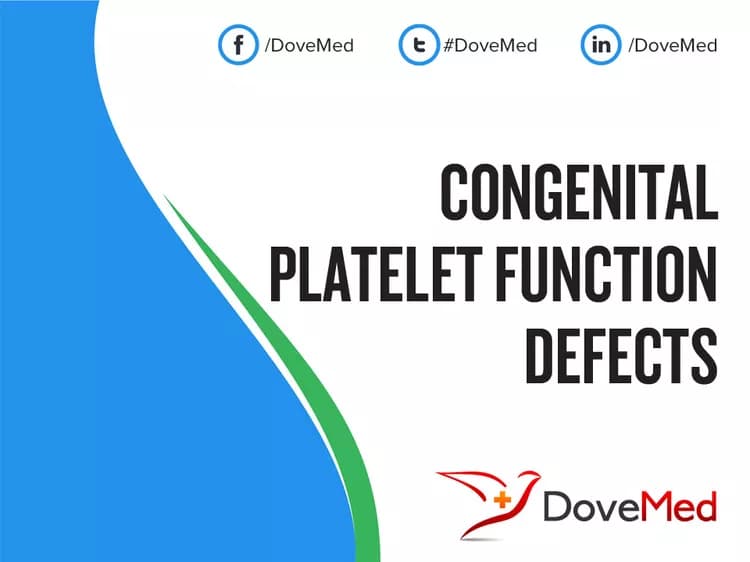What are the other Names for this Condition? (Also known as/Synonyms)
- Bernard-Soulier Syndrome (causing Platelet Dysfunction)
- Glanzmann’s Thrombasthenia (causing Platelet Dysfunction)
- Platelet Storage Pool Disorder (causing Platelet Dysfunction)
What is Congenital Platelet Function Defects? (Definition/Background Information)
- Platelets are the major components in blood that help in the process of blood clotting. When there are problems with the proper functioning of platelets in blood, the condition is referred to as platelet function defects. In these uncommon conditions, the platelet count is normal, but their function is abnormal
- Congenital Platelet Function Defects are a group of disorders characterized by various abnormalities in platelet function that is present at birth (these conditions are usually inherited)
- Such defects are usually marked by bleeding disorders that lead to extended bleeding after a minor cut or bruise. The condition may give rise to complications such as severe bleeding and anemia due to blood loss
- There is no specific treatment for these set of disorders. Individuals with Congenital Platelet Function Defects should take precautionary measures to avoid bleeding situations
Who gets Congenital Platelet Function Defects? (Age and Sex Distribution)
- Congenital Platelet Function Defects are inherited by the child at the time of birth
- There is no gender predilection, both males and females are affected
- No racial or ethnic preference is observed, platelet function defects are seen worldwide
What are the Risk Factors for Congenital Platelet Function Defects? (Predisposing Factors)
Congenital Platelet Functions Defects are inherited disorders. Individuals with a family history of such disorders have an increased risk.
It is important to note that having a risk factor does not mean that one will get the condition. A risk factor increases ones chances of getting a condition compared to an individual without the risk factors. Some risk factors are more important than others.
Also, not having a risk factor does not mean that an individual will not get the condition. It is always important to discuss the effect of risk factors with your healthcare provider.
What are the Causes of Congenital Platelet Function Defects? (Etiology)
Congenital Platelet Function Defects are inherited at birth from parents, who have defective genes associated with such disorders.
These group of disorders include the following conditions:
- Platelet Storage Pool Disorder: In this disorder, there is a defect in the storage granules of the platelets that help in clotting
- Glanzmann’s Thrombasthenia: It is caused by a lack of protein that is required by the platelets to clump (aggregate) together
- Bernard-Soulier Syndrome: In this disorder, there is a lack of a certain substance, required by the platelets to stick at the site of injury
What are the Signs and Symptoms of Congenital Platelet Function Defects?
The signs and symptoms manifested by Congenital Platelet Function Defects are:
- Excessive bleeding
- Abnormally increased flow during menstrual periods
- Continuous and abnormal bleeding during and after surgery
- Bleeding from the nose
- Bleeding of the gums
- Easy bruising
How is Congenital Platelet Function Defects Diagnosed?
The diagnosis of Congenital Platelet Function Defects may include:
- A complete evaluation of medical history, family history, and a thorough physical exam
- The diagnostic blood tests may include:
- Complete blood count (CBC)
- Bleeding time
- Platelet aggregation test
- Prothrombin time
- Partial thromboplastin time (PTT)
Many clinical conditions may have similar signs and symptoms. Your healthcare provider may perform additional tests to rule out other clinical conditions to arrive at a definitive diagnosis.
What are the possible Complications of Congenital Platelet Function Defects?
Congenital Platelet Function Defects may lead to complications such as:
- Severe, extensive, and prolonged bleeding
- Anemia, resulting from excessive blood loss in menstruating women
How is Congenital Platelet Function Defects Treated?
- There is no particular treatment for Congenital Platelet Function Defects
- Patients are advised to avoid taking aspirin, non-steroidal and anti-inflammatory drugs, such as ibuprofen and naproxen, because these medications interfere with the normal blood clotting process
- Individuals with this condition are educated about their illness, about support groups that are available, nearest hemophilia center, and about the signs and symptoms of an evolving bleed. The individuals are advised to:
- Maintain a healthy lifestyle
- Avoid medications that may precipitate a bleed
- Let other treating physicians (healthcare providers) know about their condition
How can Congenital Platelet Function Defects be Prevented?
- Currently, there are no specific methods or guidelines to prevent Congenital Platelet Function Defects, since these are genetic conditions
- Genetic testing of the expecting parents (and related family members) and prenatal diagnosis (molecular testing of the fetus during pregnancy) may help in understanding the risks better during pregnancy
- If there is a family history of the condition, then genetic counseling will help assess risks, before planning for a child
- Active research is currently being performed to explore the possibilities for treatment and prevention of inherited and acquired genetic disorders
What is the Prognosis of Congenital Platelet Function Defects? (Outcomes/Resolutions)
- Congenital Platelet Function Defects are not curable; the affected individuals have to live with the condition their entire lives
- However, certain precautionary measures should be adopted to avoid bleeding situations
Additional and Relevant Useful Information for Congenital Platelet Function Defects:
The following DoveMed website link is a useful resource for additional information:
Related Articles
Test Your Knowledge
Asked by users
Related Centers
Related Specialties
Related Physicians
Related Procedures
Related Resources
Join DoveHubs
and connect with fellow professionals


0 Comments
Please log in to post a comment.